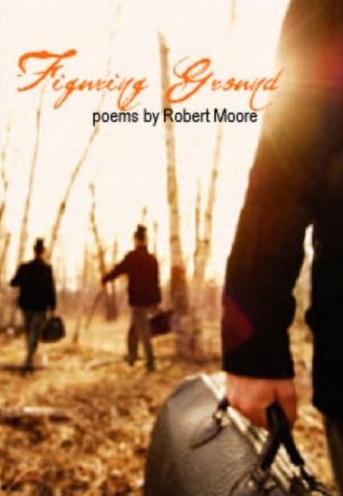
Interview with Robert Moore
If you've been following Robert Moore's work, there's only one question on your mind: What’s with all the cow poems? Moore explains in a wide-ranging conversation with Roderick Moody-Corbett.
Robert Moore has worked as a teacher, actor, director and playwright. A professor of English at the University of New Brunswick in Saint John, his first book of poetry, So Rarely in Our Skins (2002) was a finalist for both the Atlantic Poetry Prize and the Margaret and John Savage First Book Award, and long-listed for the ReLit Award in Poetry. His second book, Museum Absconditum (Wolsak and Wynn, 2006), was also long-listed for the ReLit Award in Poetry. His most recent book, Figuring Ground (Wolsak and Wynn, 2009), was published last April. Robert lives with his partner, Judith Mackin, and their children Alexandra Moore and Robyn Mackin in the south end of the City of Saint John.
Roderick Moody-Corbett: You’ve said that “art is the antidote for, not the cause of, madness.” Have you written yourself sane yet?
Robert Moore: God, I hope not. But madness—actual shithouse craziness—has never been much of a concern for me. The only kind of madness that interests me is the ordinary kind, the sort that tempts us to believe that the world isn’t much larger, or more interesting, than our own perfectly reasonable estimation of it. Making art puts you in the business of seeing how little you see, knowing how little you know. That said, I’m aware that art, genuinely and whole-heartedly pursued, has the potential to lead one beyond the pale, off the edge of the maps, beyond hope of recovery. Most of the time, however, I confess I sail pretty close to the shore.
RMC: You seem fairly unperturbed by the cross-pollination of literary tricks. Has your experience as a playwright and director had much bearing on your poetry, or vice versa?
RM: Without a doubt. Doubt’s a factors only if I’m obliged to say precisely how and where what I’ve learned in the theatre is brought to bear in the poetry. One place it certainly figures is in appreciating how verse sounds when read aloud, what a sensual thing the spoken word is, hung upon a moment, compounded out of breath and flesh. Poets do “voice” in two ways. Primarily, in the peculiar, refined manner in which they arrange sensibility upon a page. A poem, after all, is one of the last of the handmade artifacts, signed by the maker. But there’s a second sense of voice, of course: in the way a poet delivers that artifact in the flesh to an audience in a room at a particular time and place. I take that secondary sense of voice very seriously. I remember an acting teacher who advised us inwardly to preface every line you say on stage with the breathless phrase, “I alone am escaped to tell you,” no matter how pedestrian the sentiment, even if you’re just asking someone to pass the butter. It’s very good advice. Genuine conviction is infectious, it can’t help but engender sympathy. It’s why some actors can literally read the telephone book and hold an audience’s attention.
RMC: You wrote your dissertation on the fiction of Donald Barthelme. What kind of effect has his writing had on yours? There are some amusing similarities to be found in Figuring Ground and Barthelme’s interpolated novelette A Manual for Sons, I think.
RM: Donald Barthelme is definitely the writer who taught me the most about how to put one thought after another on paper, in reasonably unexpected ways. I teach his novel Snow White every three or four years and I’m always struck by how much I’ve stolen from him. And how grateful I am for having the kind of memory that enables me to reproduce, or at least approximate, his effects even while allowing me to forget entirely that they didn’t originate with me.
RMC: One detects an almost Wittgensteinian prudency with words in your poems; an exactness embalmed with a kind of comical sensuality. How important is it to get the words exactly right?
RM: Well, that’s the thing, isn’t it: getting the words exactly right. "Embalmed exactitude" is an interesting notion. But if Wittgenstein taught me anything it’s that saying and knowing are practically the same thing. I recall something John Searle said about language, following Wittgenstein: that we wouldn’t know how to fall in love unless we’d read about it beforehand. If Searle and company are right—and I see no reason to disagree—the word takes on the function of a supreme source of creation; in the beginning is the word. As poets—as word beings struggling to unsay and say in the most meaningful, suggestive fashion possible, even while immured in the prison house of language—we have a special obligation, if only to ourselves, to get those words "exactly right."
RMC: A poem like “Dear Reader of the Future” is highly colloquial. How conscientious are you that your poems retain a spoken quality?
RM: Very. The challenge for me is always to make poems that establish a reasonably firm footing in the reader’s mind on first hearing. I suppose my interests in that regard are not that far removed from Wordsworth’s. The great trick, of course, is to manage, as it were, to fit a many-roomed mansion of significance inside a homely thatched hut. That said, and at the risk of belabouring the analogy of dwelling, I do subscribe to the truth of something Geoffrey Hill once said: public toilets have a obligation to be accessible, poetry doesn’t.
RMC: One of the abiding charms of your poetry is the acerbic poignancy and wit you bring to the commonplace. “Ankles thicker/than a ten-year-old’s neck,” and “the boiled vegetable light/of another day,” are personal favourites. Yet, in spite of their humorous trimmings, many of these poems dwell on pretty grave subjects. Do you find that humour enables you to engage with the solemnity of your material without succumbing to a kind of baby nihilism?
RM: The short answer to that is “yes.” Beckett’s definition of tragicomedy—“laughing wild ‘mid severest woe”—has always seemed to me the only responsible attitude to strike in the face of the prospect of our inevitable slide back into the nothingness out of which we came. There’s nothing funnier than death. Dying wouldn’t be half the giggle if it were actually a matter of choice.
RMC: According to your bovinical eschatologists: “None of what passes for the present is real/ Real is the memory of what’s to come.” Far from merely plaintive, then, the elegiac tones of “How Many Times Atlantis,” “The Stories Your Parents Tell You,” “It’s Terrible Parting” seem to provoke hesitant infinities. Do you find that it’s the writer’s task to achieve, or induce perhaps, a memory of what’s to come?
RM: I very much like that phrase: “the memory of what’s to come.” I must have stolen it from someone. Mercifully, I’ve forgotten whom. But yes, I do think that inducing a memory of what’s to come is part of the writer’s task. On the other hand, maybe I should resist this question more. You see, I’m not sure that writers have a task. If they do, I’m not sure I’d want to know what it is. The point of that particular line, as inscribed in the sacred annals of cow-dom, was to underscore how we came from nothing and to nothing we’ll return, that our reality, hammered together in and by time, is at one and the same time all there is and as insubstantial a pageant as one of Prospero’s Tuesday morning dumb shows.
RMC: Again with the lyrical purloining. Are you being modest when you say that you’ve stolen a phrase? With Barthelme you mentioned that you were grateful to have a memory that could both reproduce and forget. Could you elaborate a bit on this technique? Is it a technique? Or is it an occurrence, perhaps?
RM: Oh, I’m not being modest. I’m merely being as honest as modesty will permit. Honestly, it’s remarkable to me how selective my memory is when it comes to literature. Consciously, I remember next to nothing. Unconsciously, however, I’m constantly mining a mental stratum chock-a-block full of phrases, moments, etc., from things I’ve read and admired. Originality for me may simply consist in the artful rearrangement of the great already-said. Someone—was it Eliot?--said something like, “Talent borrows, genius steals.” If whoever said this was right, I have the stuff of genius in me, no mistake.
RMC: How has teaching influenced your work?
RM: When it’s your job to convince rooms of peculiarly innocent yet weirdly cynical strangers, year after year, that “My Last Duchess” or “Sailing to Byzantium” has the potential to change their lives, it tends to make you a very careful reader of what’s gone before. Except at the graduate level, you’re rarely, if ever, preaching to the choir. Remember that definition of a professor? As the one who talks in other people’s sleep? Given our culture’s interest in poetry, being a professor of English in this day and age is excellent preparation for any poet when it comes to vanity management, proportion control.
RMC: So you wouldn’t say that being an academic has cramped your style?
RM: It certainly has informed my style. Academics are, by profession, citizens of very small countries; smallness of mind is something of an occupational hazard. Its pleasures, therefore, have to be actively resisted, but I doubt it’s limited me as a poet. For me, being an academic simply means that I’m fortunate enough to make a living reading, writing about reading, and sharing my reading with others.
RMC: Would you consider yourself a maritime poet?
RM: I may be, but supporting any claim to be regional in this day and age is a delicate matter. How do I, a putatively maritime poet, defend the fact that I know as much about Michael Jackson as I do about catching lobster? Being an academic doesn’t help, either; we’re almost all “from away.” Academics tend to carry their homes on their backs.
RMC: Roland Barthes once said that the prestige of steak derives from its quasi-rawness. I was hoping that you might comment on those bovine muses of yours.
RM: My interest in cows as personae got started with something Annie Dillard, one of nature’s most sympathetic correspondents, once wrote about cows: “They’re a human product, like rayon. They’re like a field of shoes.” She’s absolutely right; cows as we know and quite literally consume them are, unhappily, essentially human. The spectacle of their near-sublime detachment coupled with the knowledge of what we so casually do to them on a daily basis—and in their millions—makes them a natural, nearly inexhaustible, source of interest. For me, no animal in creation better—more essentially?--embodies what is at once most sacred and banal, absurd and horrific, about being human; the planet’s great death-dealers uniquely cursed with the knowledge of death.
RMC: Forgive me for this: but it’s been said that “your typical four-ounce hamburger is packed/ with the flesh of between 50 to 100 cattle.” On average, how many hamburgers do you eat a week?
RM: Next question.





